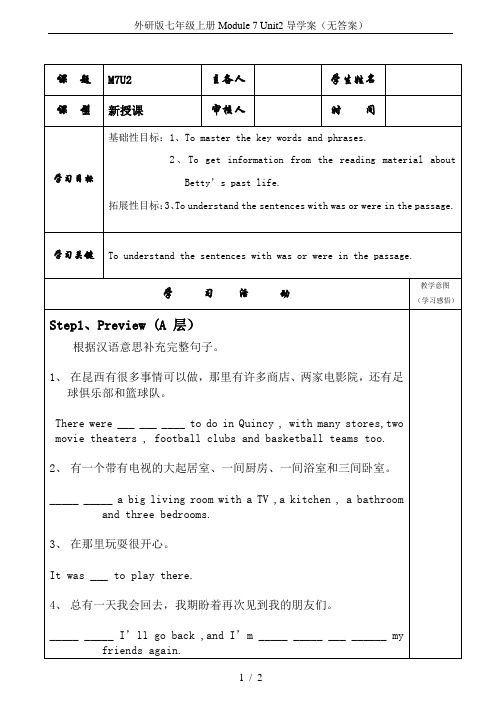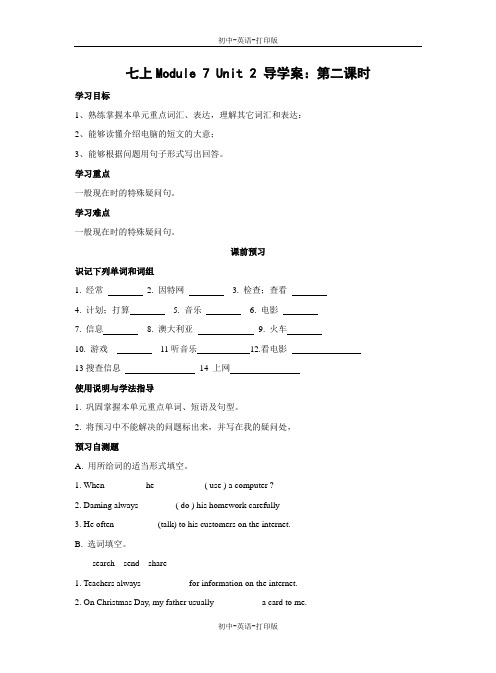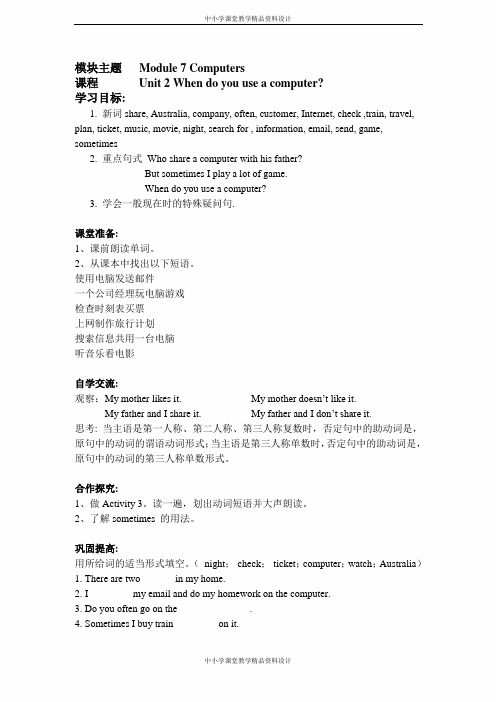外研七年级上册:模块七第二单元导学案
- 格式:doc
- 大小:33.00 KB
- 文档页数:4


七上Module 7 Unit 2 导学案:第二课时学习目标1、熟练掌握本单元重点词汇、表达,理解其它词汇和表达:2、能够读懂介绍电脑的短文的大意;3、能够根据问题用句子形式写出回答。
学习重点一般现在时的特殊疑问句。
学习难点一般现在时的特殊疑问句。
课前预习识记下列单词和词组1. 经常2. 因特网3. 检查;查看4. 计划;打算5. 音乐6. 电影7. 信息8. 澳大利亚9. 火车10. 游戏11听音乐12.看电影13搜查信息14 上网使用说明与学法指导1. 巩固掌握本单元重点单词、短语及句型。
2. 将预习中不能解决的问题标出来,并写在我的疑问处,预习自测题A. 用所给词的适当形式填空。
1. When_________ he ___________( use ) a computer ?2. Daming always ________( do ) his homework carefully3. He often _________ (talk) to his customers on the internet.B. 选词填空。
search send share1. Teachers always __________ for information on the internet.2. On Christmas Day, my father usually __________ a card to me.3. I often __________ a movie with my parents.我的疑问课内探究1. My father is a manager of a company, so he often talks to his customers on the computer.Li Ming is often late for school.We usually send emails to our teachers.He sometimes sees his grandpa at the weekend.___________ 通常___________ 经常___________有时频度副词usually/ often/ sometimes用法小结:1)位置:在be 动词之_____,行为动词之_____。

七年级〔上〕外研版Module 7 Unit 2导学案主编人: 使用修订人: 审核人:课题:Module 7 Computers Unit 2 When do you use a computer?(2课时) 年月日第二课时一、学习目标1、学习本单元Pronunciation and speaking局部2、学习当主语是一二人称和第三人称复数时行为动词的一般现在时二、学习重点学习当主语是一二人称和第三人称复数时行为动词的一般现在时三、学习难点学习当主语是一二人称和第三人称复数时行为动词的一般现在时课前预习一、使用说明与学法指导1、教材27页上5、6、7题课前同桌互相练习,课上老师教读纠正音标,并抽查学生6、7题的练习情况2、课前预习教材82页内容,行为动词的一般现在时二、教材助读在教材上找到以下句子,熟读以后想想当主语是一二人称和第三人称复数时,行为动词的一般现在时怎么构成的?We have Chinese at eight o’clock.Do you like math? Yes, I do.Do we have maths?No, we don’t.We have art and history, but we don’t have maths.I love history.Lessons begin at eight.They have four lessons in the morning三、预习自测1、读出以下单词的正确发音1)too two blue cool afternoon do school soup2) good book put woman3) talk morning draw four course autumn4) because o’clock what sorry dog hot2、翻译下面的句子1)我们11:00上美术课。
______________________________________________________2)他们9:10上历史课。

模块主题Module 7 Computers课程Unit 2 When do you use a computer?学习目标:1. 新词share, Australia, company, often, customer, Internet, check ,train, travel, plan, ticket, music, movie, night, search for , information, email, send, game, sometimes2. 重点句式Who share a computer with his father?But sometimes I play a lot of game.When do you use a computer?3. 学会一般现在时的特殊疑问句.课堂准备:1、课前朗读单词。
2、从课本中找出以下短语。
使用电脑发送邮件一个公司经理玩电脑游戏检查时刻表买票上网制作旅行计划搜索信息共用一台电脑听音乐看电影自学交流:观察:My mother likes it. My mot her doesn’t like it.My father and I share it. My father and I don’t share it.思考: 当主语是第一人称、第二人称、第三人称复数时,否定句中的助动词是,原句中的动词的谓语动词形式;当主语是第三人称单数时,否定句中的助动词是,原句中的动词的第三人称单数形式。
合作探究:1、做Activity 3。
读一遍,划出动词短语并大声朗读。
2、了解sometimes 的用法。
巩固提高:用所给词的适当形式填空。
(night;check;ticket;computer;watch;Australia)1. There are two ______ in my home.2. I ________ my email and do my homework on the computer.3. Do you often go on the ______________.4. Sometimes I buy train ________ on it.5. What do you do every Friday_________?6. Do you often like________ movies on the computer?7. He is ________ and he comes from _______________.拓展延伸:根据汉语,完成句型。


Module 7 ComputersUnit 2 When do you use a computer?◆教材分析The main topic of this unit is computer. Students can learn about how people in different places of the world use computer.◆教学目标【知识目标】Key vocabulary: customer, Australia, game, share, company, often, Internet, check, train, travel, plan, ticket, music, movie, night, search, information, email, send, sometimes,visit, cinema, clothesKey phrases: buy tickets, check email, go on the Internet, make travel plans, play games, share a computer, talk to customers, search for information, watch movies【能力目标】Through reading, listening, speaking and writing exercises, be able to ask and answer questionswith the new phrases in this unit and write a report in Present Simple.【情感目标】Be active to take part in the activities. Cooperate in a group. Be confident. 【教学重点】 能够读懂介绍自己和他人使用电脑情况的三篇短文,并能在阅读中找出每个作者的相关细节信息,完成任务。
铜谷中学七年级英语(上)导学案学习目标:1.掌握本单元的重要词汇和短语:2.一般现在时的特殊疑问句。
3.通过学习与电脑相关的词汇提高对英语学习的兴趣。
【自主学习】一.重要单词1.share___________2、澳大利亚___________ 3、澳大利亚的___________4、['kʌmpənɪ]___________5、['kʌstəmə]___________6、check___________7、[treɪn]_________8.['hɒlɪdeɪ]_________ 9.['tɪkɪt]________10、['muːvɪ]_________11、search_________12、[ɪnfə'meɪʃn]__________13、[send]_________ 14、['sʌmtaɪmz] _________ 15.['ɒfn]___________ 16.['ɪntənet]___________17.[plæn]________18.['tɪkɪt]_________19.['mjuːzɪk]_________20.[naɪt]_______21.['iːmeɪl]______22. game_________23.['sɪnəmə]_________24.[kləʊðz]_________25.['vɪzɪt]_________26.['hɒlɪdeɪ]_______二. 翻译下列短语。
1.共用一台电脑__________________2.在我家__________________3.公司经理______________________4.与顾客谈话________________5.搜索信息 ________6.上网____________________7.查看火车时刻___________________ 8.制定旅行计划 ___________________ 9.买票__________________________ 10.听音乐11.看电影 12.做作业________________________ 13.查看电子邮件_______________ 14.给我的朋友发送电子邮件_______________15.玩电脑游戏 _____________________ 16.在电脑上______________________三.根据汉语意思完成英语句子.1. 我的父亲是一家公司的经理,所以他经常在电脑上与他的顾客谈话。
七年级英语上册导学案课题Module 7 Unit 2 When do you use a computer ?课型Reading and writing【学习目标】1)熟练掌握本单元重点词汇、表达,理解其它词汇和表达:重点词汇:share, game, Internet, check, train, travel, plan, ticket, music, movie, night, search, information, email, send;频度副词often, usually, sometimes的用法重点句型:Who can…? / Who doesn’t have…? / What do you…? / When do you…?2)能够读懂介绍电脑的短文的大意;3) 能够根据问题写出答语。
【学习重点】本课重点词汇和句型,运用所学知识谈论有关自己和他人使用电脑的情况。
【学习方法】合作交流,自主探究【Learning process】ⅠPreview1.New words.1. _________ v.分享2. _________ n.游戏3. _________ n.顾客4. _________ n. 因特网5. _________ v.检查;查看6. _________ n.火车7. _________ n.旅行 8. _________ n./v.计划;打算 9. _________ n.票10. _________ n.音乐 11. _________ n.电影 12. _________ n.夜晚13. _________ v.搜寻 14. _________ n.信息 15. _________ n.邮件16. _____ v.发送 17. ______ adv.有时 18. ______ adv.经常2.Translate the phrases in to Chinese..1. ____________________ 在我家2. ____________________ 与客户交谈3. ____________________ 上网4. ____________________ 查看列车时刻表5. ____________________ 制定旅行计划6. ____________________ 买票7. ____________________ 听音乐 8. ____________________ 看电影9. ____________________ 搜索信息 10. ____________________ 查看电子邮件11.____________________在星期天 12.____________________给…发电子邮件13. ____________________ 玩电脑游戏ⅡCooperative learning【Pre-reading】Match the words and expressions in Column A with those in Column B(Part 3)【While-reading】1.Read the passage and match the questions with the people who answer them.(Part 1)2.Check the sentences.1).Jack’s father uses the computer every Friday night.2). Alice checks emails at home.3). Mike likes playing computer games.4). Mike and his parents use their home computer.3.People Things they doJackJack’sfatherAliceMike【Post- reading】Complete the passage with the correct form of the words from the box.(Part 4) 【Summary】I study, and I summarize.频度副词用法小结:1___________ 通常 ___________ 经常 ___________有时1) 位置:在be 动词之_____,行为动词之_____。
Unit2 精品教案一、学习目标:1、熟练掌握单词和短语。
3、一般现在时的特殊疑问句。
二、学习重点1、熟练掌握单词和短语。
2、一般现在时的特殊疑问句。
三、学习过程〔一〕汉译英1上网______________ 2.制作一份旅游方案_______________3.在因特网上__________4.从网上下载……_________________5.发电子邮件__________6.查火车时刻表___________________7.访问某人的网站_______ 8.在周末_________________________9.写小说_______________ 10拼写检查__________________11.为……获得信息______ 12.用电脑________________________〔二〕改写句子13. They go to the park two times a month.(就划线局部提问)__________ ___________ ____________ they go to the park?14. She sends four emails a month. (就划线局部提问)___________ ___________ emails _________ she ________ a month?15. He makes travel plans on the Internet. (改为一般疑问句)__________ he __________ travel plans on the Internet?16. I use the Internet and send emails.(改为否认句)I _________ use the Internet ________ send emails.17. He can play the piano very well. (就划线局部提问)__________ ___________ he play the piano?〔三〕教材探究When do you use a computer? 你什么时候用电脑?when针对时间提问,答复通常是时间。
Module 7 ComputersUnit 2 When do you use a computer?教学设计课型Reading and writing教材分析The main topic of this unit is computer. Students can learn about how people in different places of the world **puter.教学目标1. About knowledge: to understand questions and answers.2. About ability: to improve listening, speaking, reading and writing skills.3. About attitude: to be active to study and be confident.知识与能力1. Grammar: special questions and answers; affirmative and negative forms in Present Simple.2. Key vocabularies: customer, Australia, game, share, company, often, Internet, check, train, travel, plan, ticket, music, movie, night, search, information, email, send, sometimes, visit, cinema, clothes2. Phrases: buy tickets, check email, go on the Internet, make travel plans, play games, share a computer, talk to customers, search for information, watch movies, work for a company3. Through reading, listening, speaking and writing exercises, be able to ask and answer questions with the new phrases in this unit and write a report in Present Simple.过程与方法Guide the Ss to find out the answers by themselves. Set up different activities to reach the teaching goals.情感、态度与价值观Be active to take part in the activities. Cooperate in a group. Be confident.教学步骤活动目的教师活动学生活动教学Step 1Lead-inActivity 1Review the newwords in Unit 1and make surethe Ss havebeen clearabout themeanings of thequestions.Teach somenew words.1. Review the text of Unit 1.2. Show some pictures, ask thestudents to look at the pictures,and talk something about thepictures.3. Introduce the new words.4. Ask the students to Read thenew words.1. Review thewords in Unit 1.2. Talk aboutthemselves and**puters.3. Guess the meaningof some words andphrases with the helpof the pictures.Step 2ReadingActivity 11. Play the recording.2. Ask the students to readthrough the passage.3. Read the passage again andmatch the questions with thepeople who answer them inActivity 1.4. Check with a partner.5. Call back the answers fromthe whole class.Keys:1 Mike can use **puter onSunday.2 Jack shares a computer with hisfather.3. Alice has a friend in Australia.1. Listen to therecording.2. Read through thepassage.3. Read the passageagain and match thequestions with thepeople who answerthem in Activity 1.4. Check with apartner.。
一、Warm-up:(热身)
Look at pictures and learn the new words and phrases.
二、Inquiry learning(探究学习)
(一)设问导读
Task1.Read quickly and match (A1)
(二)自学检测
Task1.Read and check (A2)
三、Consolidation(巩固练习)
1.Work in pairs and answer the questions (A5)
四、Extension(拓展延伸)
Jessica is a 25-year-old woman. She works in a company. She is a
busy woman. Like many young people, the computer is the most(最) important part in Jessica’s daily life. She spends a lot of time in front of a computer every day. In the morning, she reads news on the computer for one hour and then she works for three hours. In the afternoon, she works on the computer for about four hours. When she goes home in the evening, she still sits in front of her computer. She plays games or talks with her friends on the Internet. Sometimes she buys things, such as books, clothes on the Internet. She says that she cannot leave the computer in her life.
1. How old is Jessica?
A. She is twenty.
B. She is twenty-two.
C. She is twenty-four.
D. She is twenty-five.
2. Where does Jessica work?
A. In a company.
B. In a school.
C. In a hotel.
D. In a hospital.
3. How long does Jessica work a day?
A. About three hours.
B. About four hours.
C. About five hours.
D. About seven hours.
4. What does Jessica usually do on the computer in the evening?
A. She reads news.
B. She works.
C. She listens to music.
D. She plays games.
5. Which of the following is TRUE?
A. Jessica is not happy with her daily life.
B. The computer is important for Jessica.
一、Revision
Task1.Check reading
Task2. Read to find the phrases.
1. 公司经理______________
2. 同某人的顾客交谈
______________
3. 通过电脑______________
4. 上网______________
5. 检查火车时间表______________
6. 制定旅行计划______________
7. 买票______________ 8. 听音乐______________
9. 看电影______________10. 在互联网上______________
11. 搜索信息______________12. 做家庭作业______________ 13. 检查电子邮件______________14. 发电子邮件给某人
______________
15. 玩电脑游戏______________
Task 3.Interview your group members. Ask and answer questions. (What…? W here…?)
Task4.Write a short passage according to task 3 and A5, then share in the class.
二、Consolidation
Complete the passage. (A4)
三、Extension(拓展延伸)
Module task: Making a survey about computers. (P47)。